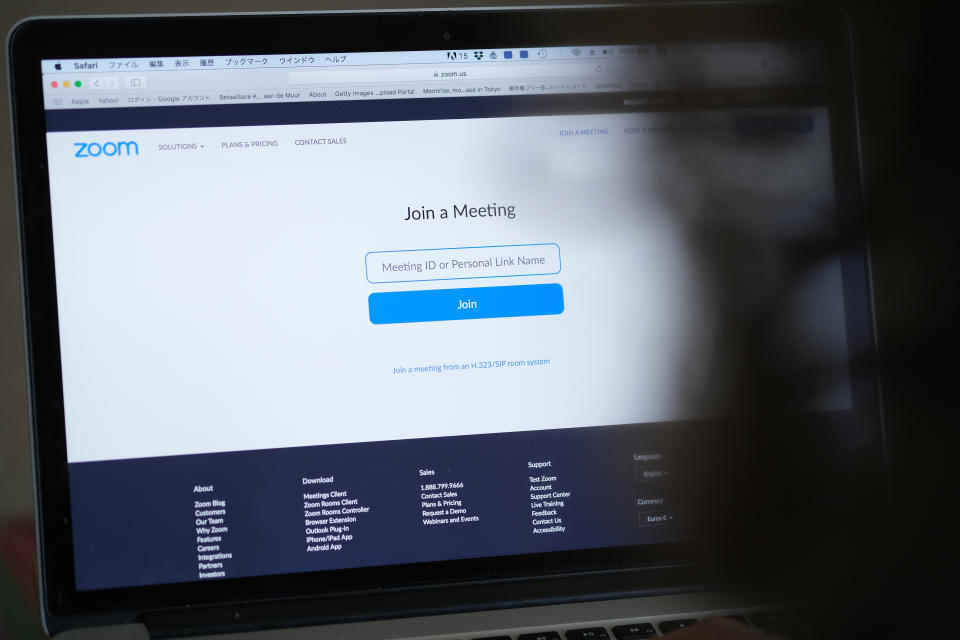Coronavirus: Why it's OK to take a break from Zoom meetings and virtual pubs

Apps like Zoom (ZM), Google Hangouts (GOOGL), Skype (MSFT) and FaceTime (AAPL) are doing a great job of keeping us connected at a time when loneliness is a real problem. During the lockdown, these platforms have become a social lifeline for a lot of people – particularly those living alone.
In recent weeks, the virtual pub has become the default social activity. In lieu of going to an actual pub, we’re now getting together online to chat, drink, do quizzes and play games to pass the time in the evenings. In the daytime, many of us are connecting with colleagues and bosses virtually – using video conferencing technology to participate in meetings, give presentations and more, all from home.
Not surprisingly, the demand for video conferencing apps has surged in recent weeks. Enterprise-focused mobile app downloads reached 62 million mid-March, according to a report by App Annie – up 45% from the week before and up 90% from the pre-COVID-19 weekly download average.
The COVID-19 crisis has transformed the way we are working and socialising. Instead of heading to the office and sitting in meetings face-to-face, many of us are now battling an onslaught of Zoom calls, Slack (WORK) messages, emails and more, which can make it impossible to disconnect. It is now harder than ever to leave work at work when your workspace is your home.
And when we’ve spent all day on video calls with bosses and co-workers, it can be difficult to feel excited about a Friday night virtual happy hour.
Read more: How to nail a virtual presentation
There are several reasons why we can feel burned out when we’ve spent too long video calling colleagues and friends. When we’re working from home, it’s often wrongly assumed that we have more time for meetings. We may feel under pressure to connect with friends and family as much as possible under the current circumstances too – and to accept every invitation that comes our way.
However, our online-only work and social lives come with a host of new anxieties. It’s easy to feel self-conscious when you are staring at your own face on video, or when you know you are being looked at on camera. It can also be awkward to cut a call short. You might want to turn off your laptop and read a book, but it’s hard to find an excuse not to join a Zoom party when you technically have nowhere else to be.
When we are hanging out with friends in real life, there is less pressure to ‘perform’ a certain way. The situation feels less artificial and it’s easier to keep a natural conversation going when you aren’t looking at your friends and relatives through the fish-eye lens of your laptop camera.
On Zoom, Skype or FaceTime, however, it’s easy to feel pressured to keep the chat going and engage in a conversation to avoid silences. It can also be frustrating to have to deal with technical problems too – it’s hard to properly catch up with friends if your computer keeps freezing.
Read more: We want the flexibility to work from home — so why are we finding it stressful?
It can also be more difficult to read non-verbal cues when you are talking to people via video too. If someone is stressed, anxious, happy or angry, you can usually tell by their body language – but it is far harder to read people’s emotions over a camera.
There are also multiple studies which show a connection between too much screen time and poor mental wellbeing. Although the majority of studies focus on child and adolescent mental health, spending a lot of time on our laptops can negatively affect adults too. Staring at digital screens can lead to eye strain, headaches and poor sleep, as the blue light emitted disrupts our circadian rhythms at night.
Social contact is more important than ever right now, but it’s OK to want to take a break from video calls. The problem is, it’s harder to think of a legitimate excuse as to why you don’t want to video chat every night when most of us are just sitting at home. Honesty is the best policy. If you aren’t in the mood, just say so – and reschedule for another day.

 Yahoo Finance
Yahoo Finance 
